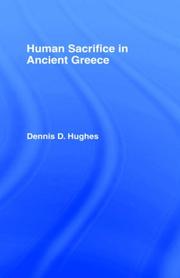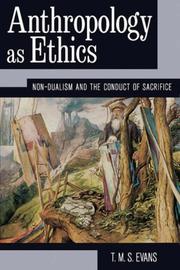| Listing 1 - 10 of 188 | << page >> |
Sort by
|
Book
ISBN: 0191634166 1299910793 9780191634161 9780191764752 0191764752 9780199659289 0199659281 Year: 2013 Publisher: Oxford
Abstract | Keywords | Export | Availability | Bookmark
 Loading...
Loading...Choose an application
- Reference Manager
- EndNote
- RefWorks (Direct export to RefWorks)
Leading specialists in theology, anthropology, religious studies and history elucidate the modern debate about sacrifice from interest shown in the 16th century through to the present day. Individual chapters discuss anthropological theories theological controversies, philosophical interpretations, and literary uses of sacrifice.
Human sacrifice. --- Sacrifice. --- Sacrifice
Book
ISBN: 0814762816 0814770436 0814764916 9780814762813 9780814770436 Year: 2017 Publisher: New York, NY : New York University Press,
Abstract | Keywords | Export | Availability | Bookmark
 Loading...
Loading...Choose an application
- Reference Manager
- EndNote
- RefWorks (Direct export to RefWorks)
In the book of Genesis, God tests the faith of the Hebrew patriarch Abraham by demanding that he sacrifice the life of his beloved son, Isaac. Bound by common admiration for Abraham, the religious traditions of Judaism, Christianity, and Islam also promote the practice of giving up human and natural goods to attain religious ideals. Each tradition negotiates the moral dilemmas posed by Abraham's story in different ways, while retaining the willingness to perform sacrifice as an identifying mark of religious commitment. This book considers the way in which Jews, Christians, and Muslims refer to 'sacrifice' - not only as ritual offerings, but also as the donation of goods, discipline, suffering, and martyrdom. Weddle highlights objections to sacrifice within these traditions as well, presenting voices of dissent and protest in the name of ethical duty.
Sacrifice --- Sacrifice. --- Judaism. --- Islam. --- Christianity.
Book
ISBN: 9780199916405 0199916403 0199980276 0190232714 0199916411 9780199916412 9780199980277 9780190232719 Year: 2013 Publisher: New York
Abstract | Keywords | Export | Availability | Bookmark
 Loading...
Loading...Choose an application
- Reference Manager
- EndNote
- RefWorks (Direct export to RefWorks)
Animal sacrifice has been critical to the study of ancient Mediterranean religions since the 18th century. Two leading views on sacrifice have dominated the subject: the psychological approach of Walter Burkert and the sociological one by Jean-Pierre Vernant and Marcel Detienne. These two perspectives have argued that the main feature of sacrifice is allaying feelings of guilt at the slaughter of sacrificial animals. Naiden redresses the omission of these salient features to show that animal sacrifice is an attempt to make contact with a divine being, and that it is so important for the worshippers that it becomes subject to regulations of unequaled extent and complexity.
Sacrifice d'animaux --- Animal sacrifice --- Greece --- Rome --- Religion. --- Sacrifice
Book
ISBN: 1459337158 1441608672 2763707912 9781441608673 9782763707914 2763787916 9782763787916 Year: 2009 Publisher: Québec Presses de l'Université Laval
Abstract | Keywords | Export | Availability | Bookmark
 Loading...
Loading...Choose an application
- Reference Manager
- EndNote
- RefWorks (Direct export to RefWorks)
Abordez la question du sacrifice avec un ethnologue, il verra aussitôt un large éventail de pratiques rituelles, allant du sacrifice humain jusqu'aux offrandes végétales, en passant par diverses immolations sanglantes. Parlez-en à un spécialiste de la morale, il verra des pratiques d'abnégation et un conflit entre égoïsme et altruisme. Discutez-en avec un théologien, il évoquera les doctrines de l'eucharistie et de la rédemption avant de se demander si le christianisme est vraiment une religion sacrificielle. Ce livre d'histoire montre comment le sacrifice est devenu l'objet de grands débats en France depuis 1520 jusqu'aux aux lendemains de la Première Guerre mondiale. À ceux qui en faisaient la louange se sont opposés ceux qui dénonçaient cette pratique. L'enquête touche donc à des problèmes de théologie et de morale¸ puis montre comment ces problèmes ont débordé dans la théorie sociale, politique, et économique. En plus des oeuvres de grands penseurs, l'enquête utilise aussi le témoignage des arts et de la littérature. Revient toujours la grande interrogation: est-ce que la notion de sacrifice éclaire les enjeux profonds de la condition humaine, ou au contraire est-ce qu'elle obscurcit ces enjeux et fait obstacle à une bonne philosophie?
Sacrifice --- History. --- Christianity.

ISBN: 1134966393 1280331135 0203032837 0203326652 9780203326657 9780203032831 9780415034838 0415034833 9781280331138 9781134966394 9781134966349 9781134966387 9780415755276 1134966385 Year: 1991 Publisher: London New York Routledge
Abstract | Keywords | Export | Availability | Bookmark
 Loading...
Loading...Choose an application
- Reference Manager
- EndNote
- RefWorks (Direct export to RefWorks)
Numerous ancient texts describe human sacrifices and other forms of ritual killing: in 480 BC Themistocles sacrifices three Persian captives to Dionysus; human scapegoats called pharmakoi are expelled yearly from Greek cities, and according to some authors they are killed; Locrin girls are hunted down and slain by the Trojans; on Mt Lykaion children are sacrificed and consumed by the worshippers; and many other texts report human sacrifices performed regularly in the cult of the gods or during emergencies such as war and plague. Archaeologists have frequently proposed human sacrifice as an exp
Human sacrifice --- Sacrifice, Human --- Sacrifice --- Greece --- Religion. --- Ritual murder --- Religions antiques --- Sacrifice humain --- Human sacrifice - Greece --- Grèce --- Greece - Religion
Book
ISBN: 9789464260588 9464260580 9789464260571 9464260572 9789464260564 9464260564 Year: 2022 Publisher: Leiden
Abstract | Keywords | Export | Availability | Bookmark
 Loading...
Loading...Choose an application
- Reference Manager
- EndNote
- RefWorks (Direct export to RefWorks)
Throughout the millennia and all over the world people have been killed by others, not only in wars and as a result of murders, but also in a ritualised way, often called human sacrifice. Much has been written about this, and research and discussion about ritual killing continue. This book offers contributions to this on-going discussion, by a re-evaluation of the term human sacrifice, arguing that not all forms of ritual killing can be considered to be sacrificial. Experts from different disciplines present new insights into the subject of ritual homicide in various regions of the ancient world. Various aspects of the phenomenon are discussed, such as offering humans to gods, making servants accompany their masters into the hereafter, and ritual killing in connection with execution of criminals and captives. While in some cultures ritual killing was accepted, others would consider it a symptom of barbarism and would use it as a reason or pretext for hostility, war, or genocide. Thus the Romans justified the violence against Carthage partly because of this, early Christians were accused of infanticide, while in turn they accused Jews of the same. The Spanish conquistadores used the argument to justify the genocide on indigenous Americans. The last chapter concerns one of the last surviving forms of ritual killing in recent history: headhunting among the Asmat.
Human sacrifice. --- Antiquities. --- Blood accusation --- Crime rituel. --- Sacrifice humain.

ISBN: 1282626582 9786612626586 0857450069 1845452240 1845456297 9781282626584 9780857450067 Year: 2008 Publisher: New York : Berghahn Books,
Abstract | Keywords | Export | Availability | Bookmark
 Loading...
Loading...Choose an application
- Reference Manager
- EndNote
- RefWorks (Direct export to RefWorks)
Anthropology as Ethics is concerned with rethinking anthropology by rethinking the nature of reality. It develops the ontological implications of a defining thesis of the Manchester School: that all social orders exhibit basically conflicting underlying principles. Drawing especially on Continental social thought, including Wittgenstein, Merleau-Ponty, Levinas, Dumont, Bourdieu and others, and on pre-modern sources such as the Hebrew bible, the Nuer, the Dinka, and the Azande, the book mounts a radical study of the ontology of self and other in relation to dualism and nondualism. It demonstrat
Ethics. --- Dualism. --- Sacrifice. --- Anthropology --- Philosophy.
Book
ISBN: 1282921827 9786612921827 0739140558 9780739140550 9781282921825 661292182X 9780739140536 0739140531 Year: 2010 Publisher: Lanham, Md. Lexington Books
Abstract | Keywords | Export | Availability | Bookmark
 Loading...
Loading...Choose an application
- Reference Manager
- EndNote
- RefWorks (Direct export to RefWorks)
We create value for ourselves by making sacrifices. In Sacrifice and Value, Sidney Axinn presents the role of sacrifice in the work of many figures in the history of Philosophy. A novel feature is the attention given to Kant's use of sacrifice, and the way this changes the usual view of the Categorical Imperative, and Kant's concept of value.
Life. --- Values. --- Sacrifice. --- Kant, Immanuel,
Book
ISBN: 1477310576 1477309373 Year: 2016 Publisher: Austin, Texas : University of Texas Press,
Abstract | Keywords | Export | Availability | Bookmark
 Loading...
Loading...Choose an application
- Reference Manager
- EndNote
- RefWorks (Direct export to RefWorks)
Traditions of sacrifice exist in almost every human culture and often embody a society’s most meaningful religious and symbolic acts. Ritual violence was particularly varied and enduring in the prehistoric South American Andes, where human lives, animals, and material objects were sacrificed in secular rites or as offerings to the divine. Spectacular discoveries of sacrificial sites containing the victims of violent rituals have drawn ever-increasing attention to ritual sacrifice within Andean archaeology. Responding to this interest, this volume provides the first regional overview of ritual killing on the pre-Hispanic north coast of Peru, where distinct forms and diverse trajectories of ritual violence developed during the final 1,800 years of prehistory. Presenting original research that blends empirical approaches, iconographic interpretations, and contextual analyses, the contributors address four linked themes—the historical development and regional variation of north coast sacrifice from the early first millennium AD to the European conquest; a continuum of ritual violence that spans people, animals, and objects; the broader ritual world of sacrifice, including rites both before and after violent offering; and the use of diverse scientific tools, archaeological information, and theoretical interpretations to study sacrifice. This research proposes a wide range of new questions that will shape the research agenda in the coming decades, while fostering a nuanced, scientific, and humanized approach to the archaeology of ritual violence that is applicable to archaeological contexts around the world.
Human sacrifice --- Sacrifice --- Indians of South America --- Antiquities. --- Rites and ceremonies. --- Peru --- Burnt offering --- Worship --- Sacrifice, Human --- Ritual murder
Book
ISBN: 0804777365 9780804777360 9780804759021 0804759022 Year: 2010 Publisher: Stanford, Calif. Stanford University Press
Abstract | Keywords | Export | Availability | Bookmark
 Loading...
Loading...Choose an application
- Reference Manager
- EndNote
- RefWorks (Direct export to RefWorks)
Glory and Agony is the first history of the shifting attitudes toward national sacrifice, violence, and victimage in Hebrew culture over the last century.
Zionism in literature. --- Israeli literature --- Jewish literature --- Sacrifice --- Human sacrifice in literature. --- History and criticism. --- Judaism. --- Isaac --- Sacrifice. --- In literature.
| Listing 1 - 10 of 188 | << page >> |
Sort by
|

 Search
Search Feedback
Feedback About UniCat
About UniCat  Help
Help News
News